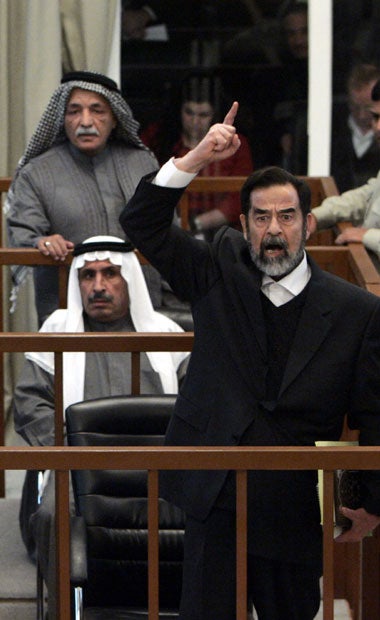Saddam trial in shambles as former dictator and his defence team walk out

The trial of Saddam Hussein collapsed into chaos within minutes of restarting when the former Iraqi leader and his legal team stormed out in protest at the forced removal of a co-defendant from the courtroom.
The case had resumed yesterday with a new chief judge, the third to hold the post in the past fortnight, immediately clashing with the accused and their lawyers.
The proceedings came to a premature halt after Saddam's former intelligence chief and half-brother, Barzan Ibrahim al-Tikriti, was dragged out for asserting that the court was nothing but "the daughter of the whore''. Saddam stood up in solidarity, shouting "down with traitors'' and " down with America''.
The new chief judge, Raouf Abdel-Rahman, then expelled one of the defence lawyers, Salih al-Armouti - a Jordanian who had recently joined the team - accusing him of inciting his clients. "Can you do this in your own courts in your own country?" the judge asked. "Why don't we start criminal proceedings against you?''
Saddam, his co-accused, and their entire legal team then walked out in protest, insisting they would boycott future sessions unless the presiding judge apologised.
Judge Abdel-Rahman - who had been expected to impose a tougher regime on the proceedings - then ruled that the lawyers will not be allowed back.
He appointed four new defence lawyers and the case resumed with just four of the eight defendants and none of the original lawyers present.
The scenes of pandemonium at the special tribunal in Baghdad led to further declarations by the original defence team that the proceedings had lost all credibility and should be moved to another country.
During the curtailed hearing, Judge Abdel-Rahman repeatedly clashed with Saddam. At one point, when the former ruler of Iraq said he wanted to leave the court, the judge shouted: "You do not leave. I allow you to leave when I want to.'' Saddam reposted: "I was the President of your country for 35 years.'' The judge said: "I am the judge and you are the defendant'' as two guards tried to push Saddam back into his chair. At that point, the judge changed his mind, and asked them to let the former ruler out of the court. Saddam then said: "It is a tragedy. I led you for 35 years. How can you lead me out of court?''
Saddam and his co-defendants are charged with the deaths of 140 people in the Shia town of Dujail in 1982. He and the others face a series of other cases of alleged murder and human rights abuse. The Dujail trial has been mired in violence; seven people associated with it, including two defence lawyers, have been assassinated. A third lawyer has sought asylum abroad.
After proceedings resumed yesterday, a witness told the court how she was arrested a few days after an assassination attempt on Saddam at Dujail. She claimed her interrogators tore off her Islamic headscarf and applied electric shocks to her head.
The woman, whose identity was not disclosed, told the court that 16 other members of her family were also arrested, and seven of them, including her husband, were killed in detention.
Describing her alleged mistreatment, the woman said: "I was in pain. I thought my eyes would pop out.'' Two of the defendants who had remained in court - Ali Dayih Ali and Mizhar Abdullah Ruwayyid - were among those who had burst into her home to arrest her, she said.
The four new court-appointed defence lawyers did not cross examine her.
The position of chief judge on the panel of five was originally held by Judge Rizgar Amin, who resigned on 15 January blaming Iraqi and US officials for putting political pressure on him for giving Saddam too much of the platform in the televised trial.
His successor, Sayeed al-Hamashi, a Shia, was removed a few days later after it was revealed that he was being investigated by the country's de-Baathification committee for his alleged close links to the former regime, even though American officials claimed the de-Baathification laws introduced in 2003 did not apply to the tribunal.
Judge Abdel-Rahman is from Halabja, where 5,000 people died in a gas attack by Iraqi forces under Saddam in 1988. Tribunal officials insisted that, despite this, the judge would be "fair and impartial'' in presiding over the trial.
A dictator in the dock
* 17 JUNE 2005
First criminal case filed against Saddam and seven co-defendants, stemming from killings of more than 140 Shia Muslims in 1982.
* 19 OCTOBER
Trial opens with Saddam challenging legitimacy of court.
* 20 OCTOBER
Masked gunmen kidnap defence lawyer Saadoun al-Janabi when he leaves his office. His body is found the next day with bullet holes in the head.
* 8 NOVEMBER
Adel al-Zubeidi, a lawyer for Saddam's co-defendant, former vice-president Taha Yassin Ramadan, is killed in a Baghdad ambush.
* 28 NOVEMBER
Trial resumes for one day, during which Saddam calls Americans " occupiers and invaders".
* 4 DECEMBER
One of five judges steps down after learning one of the defendants may have been involved in his brother's execution.
* 5 DECEMBER
Trial resumes, but defence lawyers walk out when denied right to challenge court's legitimacy.
* 7 DECEMBER
Trial adjourns after a truncated session that Saddam refuses to attend.
* 21 DECEMBER
Saddam claims Americans "tortured" him and prays openly in court.
* 15 JANUARY 2006
Chief judge Rizgar Amin resigns after complaints he failed to control proceedings.
* 23 JANUARY
His successor, Sayeed al-Hammashi, is removed amid accusations he belonged to Saddam's former ruling Baath Party. Court officials name Raouf Abdel-Rahman to replace him.
* 24 JANUARY
Trial's scheduled resumption postponed for five days.
Source: Associated Press
Join our commenting forum
Join thought-provoking conversations, follow other Independent readers and see their replies
Comments
Bookmark popover
Removed from bookmarks